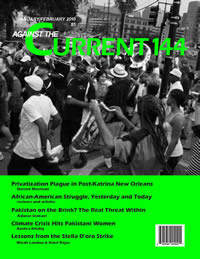Against the Current, No. 144, January/February 2010
-
The Road from Copenhagen
— The Editors -
Climate Crisis Hits Pakistani Women
— Bushra Khaliq -
Pakistan on the Brink? The Real Threat from Within
— Adaner Usmani -
The Poisoned Pill of Obama's War
— The Editors -
Rise of the Left Party: Germany's Election and Beyond
— Bill Smaldone -
German Auto Workers in the Crisis
— Dianne Feeley -
The Saga of Stella D'oro, Inspiration and Lessons
— Micah Landau and René Rojas -
Race and Class: Blacks Still Taking the Hit
— Malik Miah - African-American History and Politics
-
Post-Katrina New Orleans: A Third Reconstruction?
— Derrick Morrison -
From Reconstruction to Capitalist Crisis
— Derrick Morrison -
Mass Murder at Colfax, The Bloody Death of Reconstruction
— Robert Caldwell -
Democracy Seized -- and Lost
— Jim Toweill -
African-American Socialist Pioneer
— Clarence Lang -
Inspired by Injustice: Scottsboro in History
— Bill V. Mullen -
World War II and Ethnic Conflict in LA
— Daisy Rooks -
Genius At Work in Struggle
— David Finkel - Reviews
-
Where Is Venezuela Going?
— Jeffery R. Webber -
Leonard Bernstein's Tragedy
— Peter Drucker -
Do Workers Lose Their Rights?
— Nancy Holmstrom -
Every Woman for Herself
— Jane Slaughter -
Scottish Workers in History
— Paul Buhle - Letters to Against the Current
-
A Letter on Che
— Peter Drucker
Derrick Morrison
THE OUTCOME OF the Civil War registered the defeat of the Army of the Confederate states, the defeat of the army of the slaveholders, and a victory for the army of the owners of the railroads and big industrial enterprises committed to free, or wage labor. The political party of the big property holders, the Republican party, was supported by the mass of small farmers, urban workers, small business owners and the abolitionist movement.
The Civil War was an argument over who would run the country: Southern slaveholders or the Northern owners of the new industrial enterprises — railroads, machine manufacture and textile mills. Both systems had to expand, and when the election victory of Abraham Lincoln and the Republican party in 1860 signaled a halt to the expansion of slavery, the slaveholders sought to decide the matter on the battlefield.
They lost, and to seal and consolidate the victory, the government of big industrial property passed the 13th, 14th and 15th Amendments — outlawing slavery, elevating the ex-slaves to citizenship, and granting Black male suffrage.
Once the owners of big business had settled in as the undisputed masters of the United States, however, they retreated politically from the ex-slaves’ demand for “forty acres and a mule,” i.e. land. Forty acres — or 160 acres as called for in the Homestead Act — would have signified the real integration of Black people into the U.S. political, social and economic order.
Instead, Black people were relegated to the bottom of the heap as super-exploited agricultural sharecroppers with no right to exercise what they had newly won.
As this new peonage system was set up and operated, the industrial rulers of the country sent their battle-hardened army out West to clear the land of the indigenous Native Americans, and make way for the expansion of the railroads, and rise of big agriculture and manufacturing plants. This corresponded with the imperial period of European big business, where the yoke of colonization was fastened onto the peoples of Africa, Asia and Latin America.
The brief taste of political democracy that Black people experienced, Reconstruction, was deposited in their memory bank. That memory, combined with global wars, revolutions and working class upheavals in the first half of the 20th century, laid the basis for the rise of the Civil Rights movement in the late 1950s and early 1960s. This movement overthrew the system of segregation, a form of apartheid, called Jim Crow. Thus began the “Second Reconstruction,” a period of great political, social and economic mobility.
The post-Civil War rulers who owned railroads, factories, and mills had now become imperial. The big business interests of the United States ran the world economy, dominating the control of raw materials such as oil, rewarding the friends of imperialism and disciplining, i.e. waging war, on those who step out of line.
The imperial masters had no strategic problem in dispensing with Jim Crow, as long as the movement for Black rights stayed within the two-party system. No matter how many elected officials you accumulate, as long as they are Democrats and Republicans there is no threat to the worldwide business empires of corporations like Bank of America and ExxonMobil. Every two-party President, Senator and Congressperson is ultimately responsible to mega-business and financial interests.
Now, of course, that system is in serious crisis. The collapse of powerful financial institutions like Bear Stearns and Lehman Brothers points to deep-seated problems in the global economy. Banks have fallen like dominoes, and those who work for wages and salaries are losing jobs and homes due to the mistaken calculations of a powerful and super-rich few.
Our movement in New Orleans has served as an important example in the fight to defend public health care, no matter the outcome. Ultimately, however, decisive victory in the struggle to defend public housing, public schools and public health care can only be mounted with a fighting and mobilized trade union movement that would spearhead the rise of a mass workers’ party, fighting against the Democratic and Republican parties to replace the big business government with one based on the workers, farmers and all oppressed and exploited groups.
Such a movement and party could end the imperialist wars that drain the country and the anarchy of the profit-driven economy, and bring about the real rebuilding and reconstruction of New Orleans, the Gulf Coast, and the rest of the United States. For some of us, the movement in New Orleans is a small contribution toward that end.
ATC 144, January-February 2010

